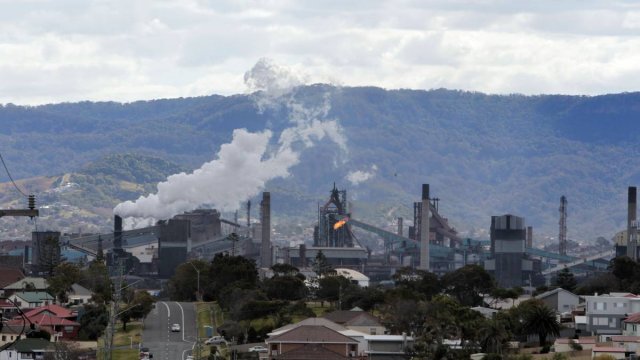
A Greens bill that would require all New South Wales government-funded infrastructure projects to use Australian-made steel is making its way through the NSW Upper House. The bill, which has the support of all parties except the Coalition, is expected to pass in the next session.
The Greens say their Steel Industry Protection Bill will stop the loss of thousands of jobs in the Illawarra and provide long-term security to the Port Kembla steelworks.
Cath Blakey, Greens federal election candidate for the seat of Cunningham, which covers Wollongong and Port Kembla, said the bid to save the steelworks is one of their priorities in the election campaign, alongside action on climate change, accepting refugees and funding for public education.
Blakey told Green Left Weekly: “The steelworks is really vital infrastructure and a manufacturing base of the Illawarra. If we're going to have a future for renewable energy and jobs for people, we need to keep the steelworks here.”
Last year the Bluescope-owned Port Kembla steelworks was plunged into crisis. The price of steel on world markets dropped significantly due to a glut caused by Chinese exports, which reached a record 112 million tonnes last year.
To plug the $200 million hole in their operating budget, the company cut 500 jobs and workers voted to take a three-year pay freeze on the company's promise it would help save another 4500 jobs.
Bluescope also scored a deferment of $60 million worth of payroll tax over the next three years from the state government.
This is a stop-gap measure that will not guarantee the steelworks stays open in the long-term. With estimates that China will continue to export 100 million tonnes of steel a year, the price of steel on international markets will not recover quickly.
The Greens bill is an attempt to increase the domestic market for Australian-made steel to provide long-term certainty. Currently, less than half of steel used in government-funded projects is produced domestically.
Blakey said: “We saw the state government give the steelworks payroll tax deferment, and it was great that it was one of the things that kept the steelworks open, but if we actually pay for materials then we should get something in return for that public investment.”
During doorknocking for her election campaign, Blakey has met people who have been confused by the Greens' support for keeping the steelworks open, due to it being a big polluter. In response she said: “It has to be done somewhere. If we keep the steelworks here it can be regulated here and environmental, health and work safety conditions can be a lot tougher here than in parts of Asia.”
NSW Greens MLC David Shoebridge believes it is vital to keep the steelworks open to help in the transition to a zero-carbon economy. While launching the Greens steel bill in March he said: “With an ongoing guaranteed market for its products, the Australian steel industry can invest in cutting-edge low-carbon steel production facilities.
"The Steel Protection Bill will also ensure that it is Australian steel, built to the highest environmental and labour standards in the world, that builds the new rail lines and renewable energy infrastructure that builds the State's clean tech future.”
Besides the steelworks, the Illawarra is also home to several coalmines. These mines produce both thermal coal, which is burnt to make electricity, and coking coal, which is used to make steel. The Greens' policy is to retrain coal workers and phase the industry out, starting with the closure of the most polluting coal-fired power stations and transitioning to renewable energy.
Blakey said: “When the Newcastle steelworks were shut down there was a transition plan over six years. Workers were allowed to retrain on work-time and this was paid by Bluescope.”
Phasing out the use of coking coal will be harder.
Blakey said alternatives to making steel with coal exist, such as using more recycled content in the steel and more efficient processes. Saving the steelworks would be a good start though.
Blakey said: “Bluescope is currently relying on the use of coking coal in their steel production but it would be great to have longer term certainty in making steel so that they could have time to develop other methods.”
Like the article? Subscribe to Green Left now! You can also like us on Facebook and follow us on Twitter.